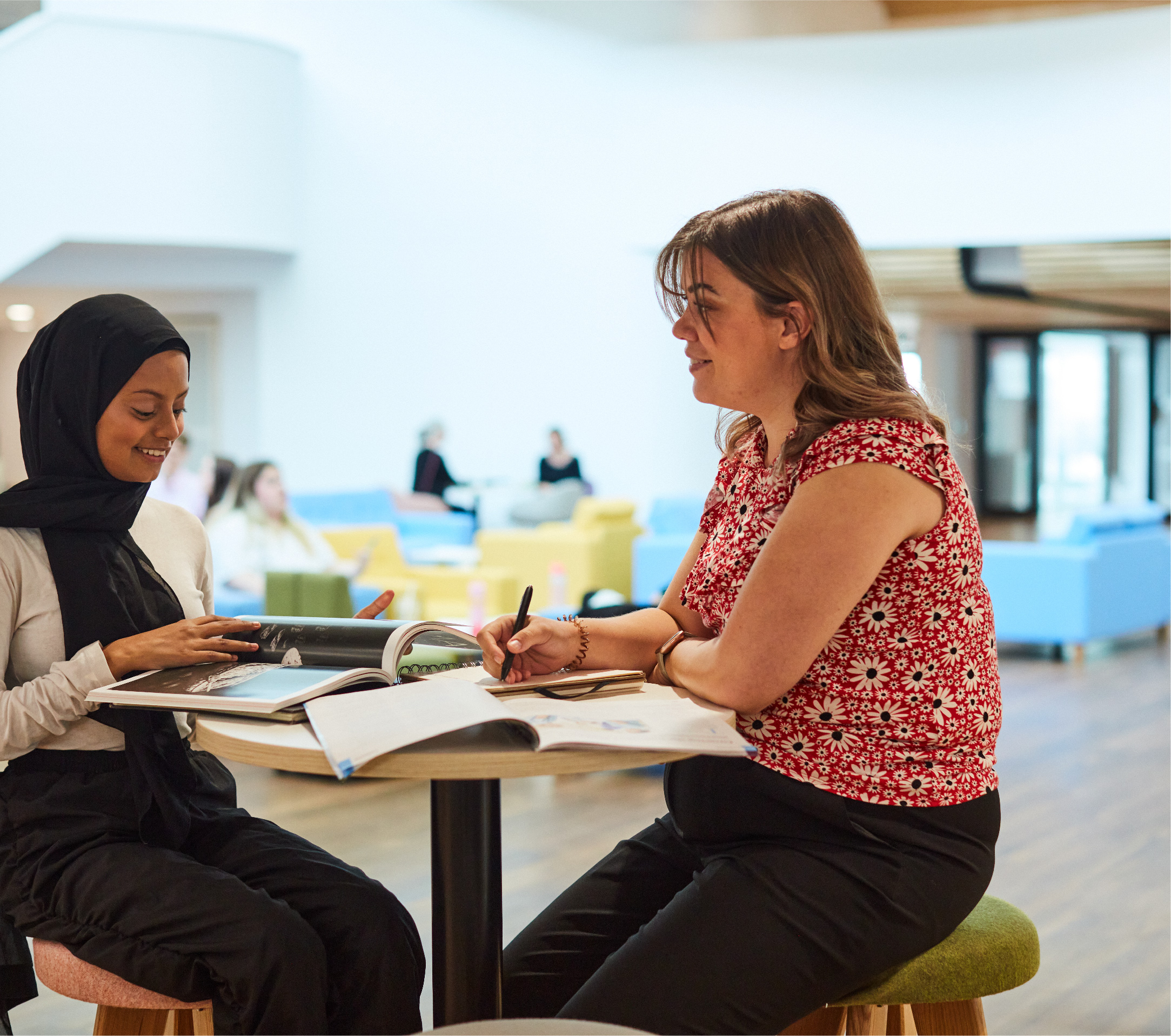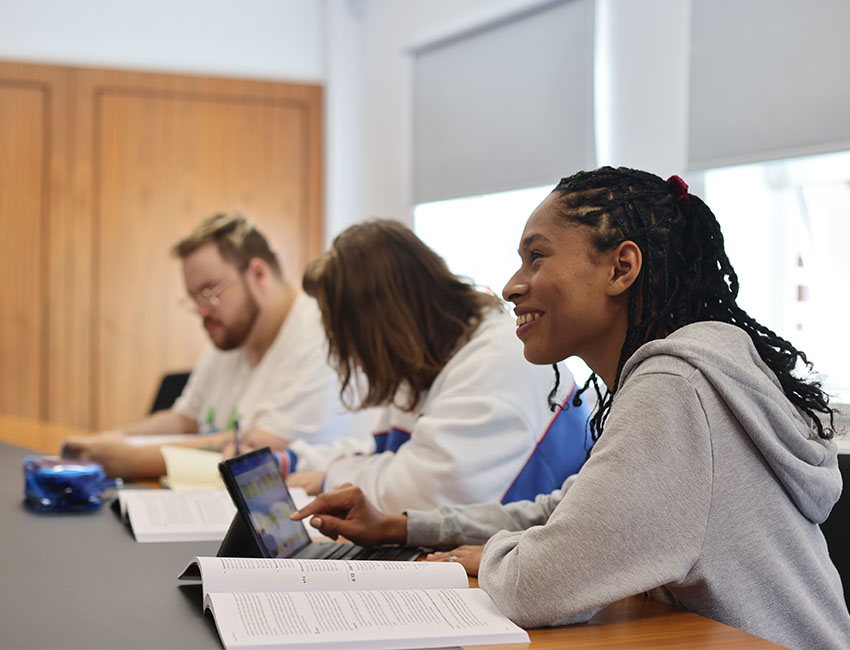Our Criminology with Policing degree will prepare you for a range of rewarding roles in the criminal justice system. You'll develop an understanding of criminology from different perspectives, in areas such as crime, criminality, victims and vulnerability.
of students go on to work and/or study
of students felt teaching staff had supported their learning well
First for jobs
The University of Worcester is first in the UK for sustained employment, further study or both, five years after graduation (excluding specialist institutions) - Longitudinal Educational Outcomes Survey 2024. Read more.
Overview
By studying Criminology with Policing, you’ll gain a strong understanding of crime and the criminal justice system. You’ll analyse the social-scientific theories on criminal behaviour and social deviance while learning about how these crimes are policed and the structures in place within the criminal justice system in England and Wales.
Our programme has been designed to align with the core principles of the College of Policing to provide you with essential skills like communication, ethics, evidence-based policing, and leadership. These skills will help you think critically and make well-informed decisions. You'll learn to understand different viewpoints and make choices that consider the needs of various groups and communities. Ultimately, you'll be able to better serve people in the criminal justice system and beyond.
We believe it's crucial for you to hear a diverse range of perspectives, so we invite guest speakers from various professions, including the Prison Service, Crown Prosecution Service (CPS), and Ministry of Justice, to share their insights and experiences. You’ll also hear from those who have perpetrated or experienced crimes in our society. These talks will give you a real-world perspective on the challenges and solutions within the criminal justice system, helping you develop a well-rounded understanding of the field.
Our strong connections within the industry mean you'll have opportunities to visit courts, local prisons, and parliament, giving you a firsthand look at the criminal justice system in action. You'll also benefit from extracurricular workshops and careers-focused activities supported by key organisations like West Mercia Police. These experiences will help you build a network of professional contacts and put you in a great position to pursue a career in the police force or to work alongside members of a police service.
Criminology at Worcester | Students' View
Course content
Each year you will study a mix of mandatory and optional modules. This flexible course lets you explore different subjects and career paths in criminology and policing.
This course has been designed to align with key elements of the College of Policing Core Curriculum – a requirement for all student police officers.
Optional modules will run if they receive enough interest. It is not guaranteed that all modules will run every year.
Optional modules
Careers
By the time you graduate, you will have an in-depth knowledge and understanding of crime and theories of criminality that will prepare you for a wide range of career opportunities both within and outside of the criminal justice system. You’ll possess highly valued skills that employers are looking for, such as gathering and analysing data, critical thinking, problem-solving, and strong communication skills.
A degree in Criminology and Policing can help you pursue a career as a:
- Police officer
- Correctional officer
- Private security
- Rehabilitation worker
- Victim liaison officer
- Crime analyst
- Probation officer
- Social researcher
- Forensic analyst
- Prison counsellor
Course highlights
Teaching and Assessment
You’ll be taught through a blend of lectures, seminars, practical classes, and workshops. Your assessments will equip you for your career by building a comprehensive skill set and providing opportunities for real-world applications. They will include essays, literature reviews, presentations, and group work, designed to enhance critical thinking, problem-solving, and effective communication skills.
Teaching and assessment contents
You will be taught through a combination of learning and teaching methods. Lectures allow for the presentation and introduction of key topics, including both traditional and contemporary sources, which allow you to begin your learning. This is then supported by seminars that enable the discussion and development of understanding of topics covered in lectures. Subject specific skills are the focus of practical classes and workshops (for example, understanding application of theory).
The course also has a keen focus on experiential learning, as there is good evidence that this can greatly enhance the your learning experience. Therefore, methods will be used such as problem-based learning, whereby you will apply theory and content from criminology to address real world, global issues (e.g., the role of policing in knife crime, tackling crime from different lenses of victimology and offending). The role of research in the learning and teaching methods of this course will be central to all areas. Such research-informed teaching and learning will include group activities, assessments, and problem-based learning. In addition, a specialised module that focuses on work based learning will offer you an opportunity to build confidence through a portfolio of concrete experiences related to employability.
The University places emphasis on enabling students to develop the independent learning capabilities that will equip them for lifelong learning and future employment, as well as academic achievement. A mixture of independent study, teaching and academic support from Student Services and Library Services, and the Personal Academic Tutoring system enables students to reflect on progress and build up a profile of skills, achievements and experiences that will help them to flourish and be successful.
Criminology is an applied subject that is sits in the heart of the community. As such, you will have the opportunity to attend careers focused activities such as a welcome week fair and an online annual careers fair. Support for such events is heavily supported by key stakeholders such as West Mercia Police and the West Mercia Police and Crime Commissioner/Magistrates/Local Detectives etc. Sitting alongside the course, extracurricular Continued Professional Development (CPD) workshops will be offered to give you the opportunity to engage with professionals/ academics and support services in the field of criminology. Strong connections with the courts and local prisons have offered students unique learning experiences in a different environment.
Meet the team
Entry requirements
UCAS tariff points required: 112
| Qualification | Grade |
|---|---|
| A-level | BBC |
| BTEC National Extended Diploma | DMM |
| T-level | Merit |
We do accept Access to HE Diplomas and other qualifications which may not exactly match the combinations above. Work out your estimated points with the UCAS tariff calculator.
Any questions?
If you have any questions about entry requirements, please call our Admissions Office on 01905 855111 or email admissions@worc.ac.uk.
Fees
Fees contents
UK and EU students
The Government has announced that it will increase tuition fees and maintenance loans by 3.1% from the 2025/26 academic cycle. Subject to approval, the University intends to increase our tuition fees in line with this and as per our terms and conditions. This means that from September 2025 the standard fee for full-time home and EU undergraduate students on BA/BSc/LLB degrees and FdA/FdSc degrees will be £9,535 per year for new and continuing students.
For more details on course fees, please visit our course fees page.
International students
The standard tuition fee for full-time international students enrolling on BA/BSc/LLB degrees and FdA/FdSc degrees in the 2025/26 academic year is £16,700 per year.
For more details on course fees, please visit our course fees page.
Student stories
How to apply
How to apply contents
Applying through UCAS
UCAS is the central organisation through which applications are processed for full-time undergraduate courses in the UK.
Read our how to apply pages for more information on the application process, or if you’d like to apply for part-time study.
Criminology with Policing BA (Hons) - L3L4
Apply to study full-timeContact
If you have any questions, please get in touch. We're here to help you every step of the way.

Admissions Office
admissions@worc.ac.uk01905 855111More to explore
Open Days
Visiting us is the best way to get a feel for student life at the University of Worcester.

The City of Worcester
Worcester is a welcoming university city with great transport links and plenty of student parking.

Accommodation
Benefit from our accommodation guarantee. We have rooms on campus to suit every budget including en-suite options.














